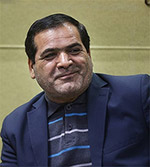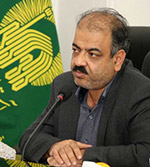The place of ‘collective interview’ in oral history
Maryam Asadi Jafari
Translated by: Zahra Hosseinian
2019-07-16
Iranian Oral History website, in which experiences and observations of people who are influential in cultural, social and political events recorded in the form of oral history, has been highly regarded by historical research centers. By arranging the speeches of these people, a picture of important events such as revolution, war, or history of institutions and organizations forms. But it should be mentioned that sometimes the taste and view of narrators, unconsciously, interferes with their speeches during collecting information, and they attempt to highlight their role more clearly. Therefore, several questions arise as to whether the speech of narrator about a major event can be fully accepted and released as representative of other effective people? Can we rely only on what a person says about the how and the why of a collective event?
Then ‘collective oral history’ comes up, which means that if we are looking for a thorough subject, we should interview with a large number of influential people and put together their sayings or make a round-table discussion and hear them. There are also different opinions. Some believe that collective interviewing is an act of self-censorship, while others believe that it prevents exaggeration by narrators. The oral history website of Iran, has called for the views of Yahya Neyazi and Dr. Abolfazl Hassanabadi on collective interviews in oral history.
The function of ‘collective oral history’ in subjects related to establishment
 Yahya Neiazi, a researcher and author of subjects relevant to sacred defense, said about the place of ‘collective interview in oral history’: ‘the proportion of the subject to the person or people, or vice versa, the proportion of people with the subject should be considered in oral history. The impact of an individual on a subject or event determines whether the oral history to be performed individually or collectively. Suppose that a person had been working in a security or intelligence service, has not allowed to tell about their duties to everyone because of the nature of their job. Collective oral history is not applicable in such subjects. Because others do not have enough information about the subject at all. But in subjects affected on individuals, the use of collective oral history is suggested. The topics relevant to establishment, or those topics to be viewed by everybody from their own angle and are familiar with some of aspects of them, as well as subjects related to various structures and organizations, and the topics to be potentially ignored by organizations, are in this group. The interviewee in an individual oral history may have a high proportion to one of the structures affecting the event and, therefore, neglects the organization which is parallel or at the same class.
Yahya Neiazi, a researcher and author of subjects relevant to sacred defense, said about the place of ‘collective interview in oral history’: ‘the proportion of the subject to the person or people, or vice versa, the proportion of people with the subject should be considered in oral history. The impact of an individual on a subject or event determines whether the oral history to be performed individually or collectively. Suppose that a person had been working in a security or intelligence service, has not allowed to tell about their duties to everyone because of the nature of their job. Collective oral history is not applicable in such subjects. Because others do not have enough information about the subject at all. But in subjects affected on individuals, the use of collective oral history is suggested. The topics relevant to establishment, or those topics to be viewed by everybody from their own angle and are familiar with some of aspects of them, as well as subjects related to various structures and organizations, and the topics to be potentially ignored by organizations, are in this group. The interviewee in an individual oral history may have a high proportion to one of the structures affecting the event and, therefore, neglects the organization which is parallel or at the same class.
‘Collective oral history’ means that a group of knowledgeable persons to be gathered and their information about the subject to be used. However, it is suggested that one of them to be the pivot of interview. When a topic like war commanding to be talked about, the person who has played the main role should be the center of interview and the rest help to complete the information. Because, in oral history, we seek to retrieve the mental space of those who had been at that time in an accident, played a role or witnessed events. The presence of other effective people alongside him provides the opportunity to get details and detailed information.
Recently, a book, titled ‘Electronic Warfare’, about the oral history of eavesdropping in war has been published by Sacred Defense Documents and Research Center, which points to a number of issues in this field. But since ‘electronic warfare’ is a complex subject and, on the other hand, it has an establishment structure during the sacred defense, the ‘Oral History of the Electronic Warfare’ project begin to cover all comments and to receive accurate narratives and information, then we begin to discuss with a group of informed people. Because the ‘electronic warfare’ was a topic which did not have the new strengthened and expanded structure. At this stage, the capacity of some students of Sharif University, the war forces and telecommunications forces of IRGC headquarters has been used, each of them knows parts of the story. So, according to the topic, one or two knowledgeable person participates at each interview. When this information collects, the puzzle of this event becomes more complete. Otherwise, we may encounter uncertainties, and it is not possible to transfer the nature of the subject and discover its hidden layers. Among the collective interviews, sometimes signs such as: a notepad or a handwritten left behind from individuals, a mission statement, a photo, and even a communication device, helps the participants in the meeting to narrate the story more precise and in more detail. Some believe that group interviews lead to self-censorship. But self-censorship may also occur in an individual interview. As we are seeking to discover the historical truths in the minds of the people on the scene and intend to reread the history, if the interviewee makes self-censorship in one or two parts during a three hour interview, there would be less harm than the lack of discovering the story.
When people are in group, they either avoid exaggeration, or maybe have done things that they do not want to be pointed there. Therefore, studying and mental background of the researcher and his in-depth knowledge of the narrator of the subject and the occurred events, opens the path for a collective interview. So, the researcher plays an important role and it can be said that the researcher bears the main burden.’
‘Convening’ brings new and more accurate information
 But Dr. Abolfazl Hassanabadi, a researcher and author on oral history and the head of the Astan Quds Razavi Documentation Center, has another view: ‘collective oral history is used in transferring memories and perspectives from one period to another. Collective oral history can be formed in different ways. For example, we want to review the attitudes of people in the 1980s to the war or revolution. To do this, we choose individuals from different social classes, such as clerics, university students, military, school students, teachers and businessmen. It's done a lot in the world and the book titled ‘Hard Times’ is one of the most famous books in this field.
But Dr. Abolfazl Hassanabadi, a researcher and author on oral history and the head of the Astan Quds Razavi Documentation Center, has another view: ‘collective oral history is used in transferring memories and perspectives from one period to another. Collective oral history can be formed in different ways. For example, we want to review the attitudes of people in the 1980s to the war or revolution. To do this, we choose individuals from different social classes, such as clerics, university students, military, school students, teachers and businessmen. It's done a lot in the world and the book titled ‘Hard Times’ is one of the most famous books in this field.
One aspect of collective oral history is to carry out collective subject projects. In this context, it is attempted to examine a particular topic from the perspective of different people. For example, in an oral history project about POWs at the Astan Quds Documentation and Press Center, first the camps were identified and then, for example, the youngest and the oldest POW, an army POW, a Basiji POW, and a Guard corps POW selected from each camp, and also the range of selection camps extended throughout Iraq. Because our goal was to study the situation of the Iranian prisoners in different camps in order to achieve a general attitude. The situation of Iraqi camps cannot be carefully judged by referring to comments of one or two people. A camp might be directed by a better or worse warden, which has been naturally overshadowed encountering with Iranian prisoners. At the end of the project, we also got good impressions.
The principle of oral history is based on a collective attitude. But when you gather a group of people around a table, you actually do the matching and subtilizing the information; this is not oral history! We did the same. But first, we completed the individual project and eventually, gathered a few people from each camp and compared their information. This "convening" lead to remembering the new information more accurately. It ultimately complements individual interviews.
You cannot hold a collective interview before an individual interview. This type of collective interview in oral history is not standard. It is unacceptable, in oral history, one person interviews with several individual. Because the principle of oral history is based on dialogue and mutual conversation and the preservation of the confidentiality of some information. When you bring together a group of people, there is not much talk. There is no serious talk because of formality and many unpleasant information is not given. A group interview alongside an individual interview is recommended for documenting and matching information.’
Number of Visits: 5395
http://oral-history.ir/?page=post&id=8669
